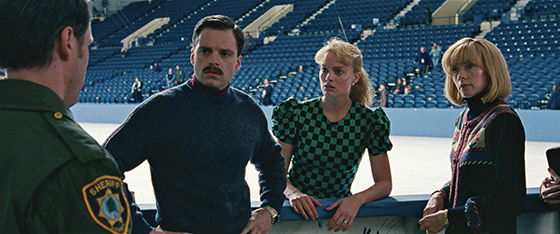I, Tonya

Tonya Harding (Margot Robbie) and Jeff Gillooly (Sebastian Stan) in an elevator in I, TONYA, courtesy of NEON.

There’s a moment late in I, TONYA in which cinematographer Nicolas Karakatsanis frames Margot Robbie’s makeup-caked face in a way that feels as though we’re staring at her through a prison visitor’s partition. She desperately smiles, rictus-like, through her tears and the result is devastating.
I’ve bemoaned how the strong female character has been reduced to the most literal of definitions: an attractive, yet glib firecracker who can take down any schlub with a quick fist to the kisser. Oh, she’s not like those other girls. She’s just one of the boys.
Directed by Craig Gillespie and written by Steven Rogers, I, TONYA somehow takes this exhausted formula and upends it. An asthmatic chain smoker, Tonya Harding was the first American figure skater to conquer the triple axel at the 1991 U.S. Figure Skating Championships. She first appears onscreen a pink-cheeked, cherubic toddler with cornsilk pigtails, dressed up soft and feminine, a look as ill-fitting as her oversized winter coat. Her stage mother, LaVona Golden (Allison Janney), roughly tugs her along, presenting the prodigy to a skeptical figure skating coach, Diane Rawlinson (Julianne Nicholson).
“How old are you, honey?” asks Diane.
“She’s a soft four”, LaVona concedes as Diane expresses hesitation.
Her daughter’s childhood lacks normalcy—no nurturing, no positive reinforcement. LaVona purposely inflicts pain upon Tonya (emotionally and physically) under the pretense of “firing her up”. The portentous child works best when agitated, intent on proving her nay-sayers wrong. This dysfunctional dynamic continues into Tonya’s adolescence; Margot Robbie dons braces and heartbreakingly cheap fashion—”I have a fur coat,” made of rabbits she hunted years ago, with her estranged father, now too small to fit her adult frame—awkward yet somehow still defiant.
Jeff Gillooly (Sebastian Stan), a gormless nobody, haunts the arena where she practices. Soft-spoken, he struggles with eye contact, stuttering out compliments about her looks. Tonya, yet fragile in her self-esteem, soaks up every word. For a minute, you think they might be happy together. They’re young, playful, and gently tease each other. Soon those barbs become heated; Jeff assaults her repeatedly. The first time almost happens too quickly to process. One can grasp why Tonya rationalizes it as a fluke.
I, TONYA is only obliquely about the Kerrigan/Harding rivalry and ensuing scandal that coincided with the emergence of the 24 hour news cycle—FOX News, sensationalized journalism, and the culture that inexorably led us to contemporary political events. At its core, the film examines performative femininity, toxic masculinity, and the deep-rooted misogyny inherent in both.
A defiant tomboy, Tonya tries to fit in with the rigidly pristine image cultivated by the sport she has mastered. Her attempts are repeated, desperate, and soul-crushing. Purple nails become perfectly manicured french tips. She sits at her little sewing machine, overjoyed upon completing a pink tulle monstrosity of her own design.
Jeff’s masculinity is toxic and complex in a manner rarely explored in contemporary cinema. Meek, yet monstrous, his voice pitches nasally in a way that grates; its near-femininity disarms you. Stan walks a razor thin edge; too much, and he would be a caricature, not enough and it could be construed as almost romanticizing abuse. In one scene, Jeff threatens Tonya in a way that is both incomprehensibly cruel and emotionally manipulative, yet you find yourself wanting to comfort him. That level of fourth-wall manipulation requires incredible nuance and skill; Stan’s is evocative of Eric Roberts’ tour-de-force outing in Star 80.
A spray-tanned Bobby Cannavale and squinty-eyed Paul Walterhauser round out an impressive ensemble as, respectively, a Hard Copy producer and Gilooly’s idiot accomplice Shawn Eckhardt (footage of the actual Eckhardt confirms a reality more absurd than fiction). However, Allison Janney’s performance is scene-chewing perfection. You miss her acerbic, frigid presence whenever she isn’t on-screen, and she doesn’t hesitate to remind you when she’s not. Robbie’s interpretation of Tonya is infuriating in the best way; she keeps fucking up, refusing to accept personal responsibility. She wastes opportunities, repeatedly reconciling with Jeff, persuading the viewer to shout expletives at the screen. Yet simultaneously, we fall for her fragility, a sympathetic and so tragically human antihero.
I, TONYA is morbid and humorous and deliberately self-aware; it doesn’t quite possess the deft touch of Coen brothers fare. Comparisons to Aronofsky’s BLACK SWAN are off—wrong Natalie Portman flick. Buoyed by the strength of multiple awards-worthy performances and characters you can’t help but legitimately give a shit about, I, TONYA leaps in and out of the fourth wall in first person, third person, and even (through the unusual omnipresence of sports commentators whose faces we never see) second person—crossing the dark comedy of DROP DEAD GORGEOUS (a brilliant cult film showcasing Janney’s trashy mom persona) with the surrealism of last year’s JACKIE.